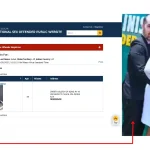
Court Stops Emefiele’s Attempt to Reclaim Forfeited 753 Duplexes and Apartments in Abuja

The Federal Capital Territory (FCT) High Court sitting in Apo, Abuja, on Monday dismissed an application filed by former Governor of the Central Bank of Nigeria (CBN), Godwin Emefiele, seeking to reclaim a massive estate comprising 753 duplexes and apartments already forfeited to the Federal Government.
The estate, situated at Plot 109, Cadastral Zone CO9, Lokogoma District, Abuja, spans over 150,462.84 square metres and had been previously forfeited to the government following orders secured by the Economic and Financial Crimes Commission (EFCC).
Delivering the ruling, Justice Jude Onwuegbuzie rejected Emefiele’s motion, which sought to set aside the interim and final forfeiture orders issued on December 2 and December 24, 2024, respectively.
The former CBN governor, through his lawyer, Adeyinka Kotoye, SAN, had claimed that he was not given adequate notice of the proceedings and that the publication of the interim forfeiture notice was placed in an obscure section of The Punch newspaper, limiting his ability to respond in time.
Emefiele further alleged that the EFCC, despite regular interactions with him over his ongoing criminal trials in Abuja and Lagos, concealed the forfeiture process from him. He argued that the forfeiture was conducted in bad faith and without due notice, ChannelsTV reported.
However, Justice Onwuegbuzie held that the EFCC had fulfilled its legal obligations under Section 17(2) of the Advance Fee Fraud and Other Fraud Related Offences Act, 2006, which only requires the publication of the notice in a national daily. He ruled that a half-page notice in a widely circulated newspaper like The Punch could not reasonably be described as obscure.
The court emphasised that Emefiele had ample time of over 14 days to contest the forfeiture but failed to do so. The judge further noted that only parties with a verifiable legal interest in forfeited property could challenge such actions and that Emefiele’s motion did not meet that threshold.
In his final ruling, Justice Onwuegbuzie dismissed the application, affirming the forfeiture and resolving the matter in favor of the EFCC.
It will be recalled that EFCC earlier stressed that the funds used for the estate’s purchase could not be traced to legitimate earnings.
Read Also:
- Husband Of Late Gospel Singer Osinachi Nwachukwu Sentenced To Death For Her Killing
- Nigeria Immigration and Interior Ministry Ignore Media Inquiries on US Convicted Child Rapist Frank Avbel’s Entry into Nigeria
About The Author
Related Articles
Tinubu, Shettima to Spend N12.2bn on Travel and Transport as Nigerians Struggle With Cost of Living and Insecurity
Details from Nigeria’s 2026 Appropriation Bill show that President Bola Ahmed Tinubu,...
ByWest Africa WeeklyJanuary 10, 2026Senegal Beat Mali to Become First AFCON 2025 Semi Finalists
Senegal secured the first semi final place at the 2025 Africa Cup...
ByWest Africa WeeklyJanuary 10, 2026Tinubu Govt Questioned Over Super Eagles Bonus Standoff
Nigeria’s Super Eagles were thrown into turmoil at the 2025 Africa Cup...
ByWest Africa WeeklyJanuary 9, 2026Tinubu’s Govt Allegedly Uses Celebrities to Promote Tax Payments Despite Altered Tax Law
A wave of video clips circulating on social media shows high-profile Nigerian...
ByWest Africa WeeklyJanuary 9, 2026












Leave a comment